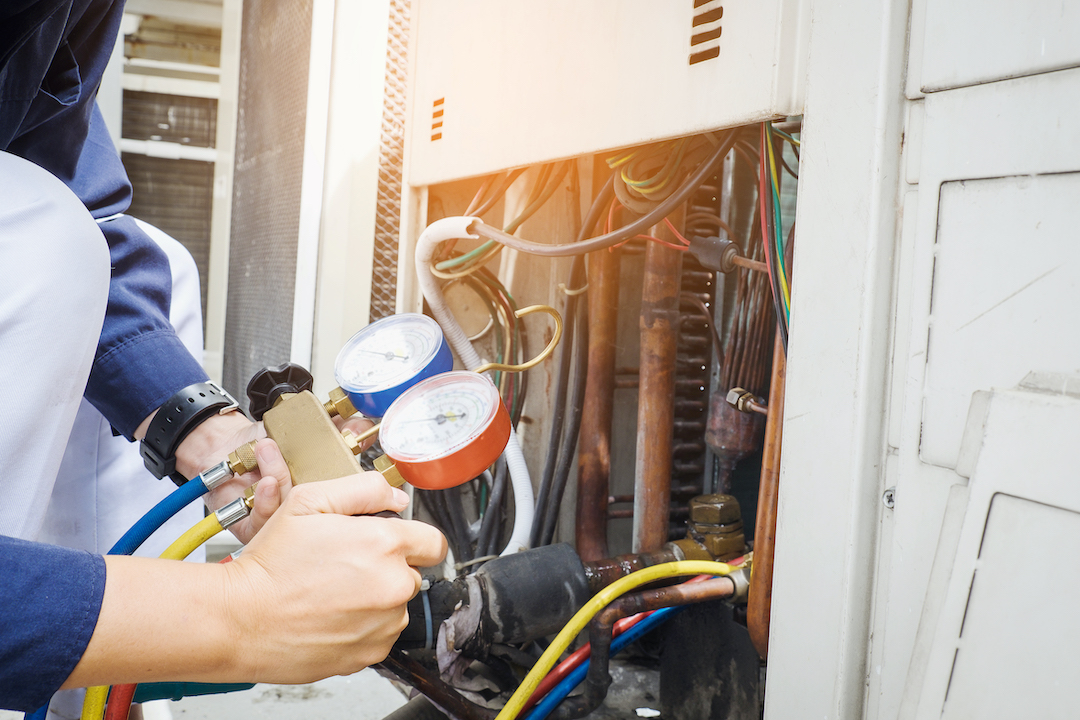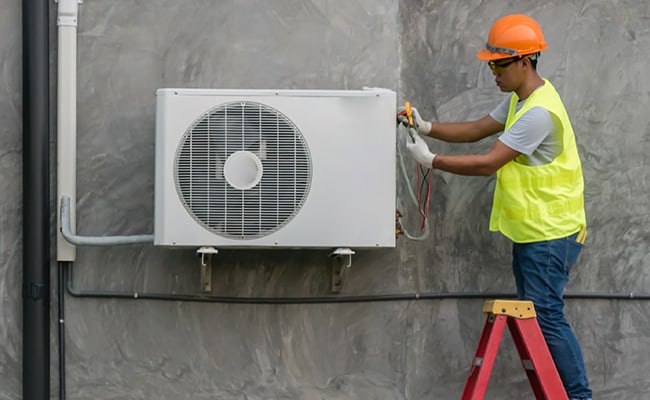Major Advantages of Annual heat pump service
Major Advantages of Annual heat pump service
Blog Article
Choosing In Between a Warmth Pump and Heating System: Secret Considerations for Your A/c Demands
When examining heating choices for HVAC requires, the decision in between a heatpump and a heater can be complex. Each system provides distinct advantages customized to specific environments and power efficiency objectives. Recognizing these distinctions is crucial for making an informed choice. Secret variables such as installation prices and environmental impact additionally complicate the selection process. Which choice genuinely straightens with one's convenience and sustainability choices? The following areas will certainly check out these factors to consider in detail.
Understanding Warmth Pumps: Just How They Function and Their Benefits
While many home owners consider different heating options, recognizing how warmth pumps feature and their advantages can substantially influence their choice. Warmth pumps operate by transferring warm as opposed to producing it. In the wintertime, they remove heat from the outside air or ground and transfer it inside, while in the summertime, they reverse this process, cooling down the home by removing warm outside. This dual capability makes them functional for year-round environment control.One of the key advantages of warm pumps is their power effectiveness. They make use of significantly much less electricity compared to conventional home heating systems, potentially leading to lower energy expenses (heat pump service). Additionally, heatpump have a smaller carbon impact, making them an eco pleasant selection. They also call for less maintenance than traditional systems, contributing to lasting price savings. On the whole, recognizing the technicians and advantages of heatpump can assist homeowners make educated choices regarding their home heating and cooling needs
Exploring Heaters: Types, Procedure, and Advantages
Heaters can be found in numerous kinds, consisting of gas, electric, and oil designs, each with distinctive operational mechanisms. Understanding these differences is crucial, as they affect efficiency and home heating performance. In addition, heating systems provide many advantages, such as constant warm result and dependability in cooler climates.
Types of Heaters
Heater can vary significantly in design and operation, with heating systems being a prominent choice amongst house owners. There are a number of kinds of furnaces, each making use of different gas resources and innovations. Gas furnaces are common, leveraging all-natural gas to generate heat successfully. Electric furnaces, on the other hand, use electric resistance to produce warmth, typically favored for their uncomplicated setup. Oil heaters, while much less typical, work in areas with minimal gas access (ductless mini splits). Additionally, condensing heating systems take full advantage of energy effectiveness by capturing and reusing exhaust gases. Each kind runs through a system of warm exchangers and ductwork to disperse warm air throughout a home. Comprehending the distinctions in between these heating system types is vital for informed a/c choices
Advantages of Heating systems
For home owners seeking dependable heat throughout chilly months, the advantages of furnaces are substantial. Heaters supply constant home heating, guaranteeing even temperature levels throughout the home. They are especially efficient in severe cool, usually surpassing heatpump in icy problems. Different kinds, including gas, electrical, and oil heating systems, supply versatility to fulfill varied demands and preferences.Furnaces likewise often tend to have lower first installment prices compared to heatpump, making them a more available option for numerous. Their robust design adds to a longer life expectancy, with many devices lasting over 15 years with appropriate upkeep. Furthermore, modern heaters are frequently outfitted with advanced innovation for improved performance, which can bring about decreased energy bills. On the whole, heating systems stay a trustworthy choice for reliable home heating.

Energy Efficiency: Contrasting Heat Pumps and Furnaces
When comparing energy effectiveness in between heatpump and furnaces, the Seasonal Power Performance Ratio (SEER) plays a vital function in identifying efficiency. In addition, an operational cost analysis exposes the lasting financial ramifications of each system. Comprehending these aspects can lead home owners in making notified decisions concerning their home heating services.
Seasonal Energy Performance Proportion
Energy efficiency plays an important duty in the decision-making procedure in between heat pumps and heating systems, particularly when considering the Seasonal Power Effectiveness Proportion (SEER) This metric actions the cooling efficiency of warm pumps over an entire cooling season, offering a standardized way to examine efficiency. Higher SEER scores show higher power performance, translating to lower energy usage and lowered energy expenses. In contrast, heaters are generally examined using the Yearly Gas Utilization Performance (AFUE) rating, which reflects heating effectiveness. When contrasting these 2 systems, property owners should focus on SEER ratings for heat pumps, as they directly influence overall power cost savings and ecological sustainability. A complete understanding of SEER can especially affect the lasting satisfaction and cost-effectiveness of the picked cooling and heating option.
Functional Price Analysis
Comprehending the operational expenses linked with heatpump and heaters is important for homeowners evaluating their alternatives. Heatpump usually supply higher power efficiency, converting electric power right into warm with marginal waste. This leads to lower month-to-month energy costs, especially in moderate climates. Alternatively, standard heating systems, particularly gas versions, might have lower upfront prices but can incur greater functional expenditures over time as a result of fuel costs and performance ratings.Moreover, heatpump can work as both heating and cooling systems, potentially minimizing the requirement for different a/c devices. While initial financial investments for warm pumps might be greater, their long-term financial savings in energy efficiency can make them a much more affordable selection for several homes. Cautious evaluation of local power rates is necessary to figure out the ideal option.
Installment Costs: What to Anticipate for every Heating System
Installation costs for heater can vary significantly between best site heat pumps and furnaces, influencing property owners' decisions. Heatpump usually have greater upfront installation costs, typically ranging from $3,500 to $8,000, depending upon the unit size and complexity of installment. This consists of the exterior system, indoor handling system, and needed ductwork modifications. On the other hand, heating systems tend to have reduced initial expenses, balancing between $2,500 and $6,000, which can be appealing for budget-conscious home owners. Installment expenditures can raise if substantial additional info ductwork is required.Moreover, the option of gas type for heating systems-- all-natural gas, lp, or electric-- can additionally impact setup expenses. While warmth pumps supply energy efficiency, their first financial investment might deter some buyers. Inevitably, examining installment prices together with long-term savings and performance will certainly help home owners in making informed decisions regarding their heater.
Climate Considerations: Which System Does Better in Your Location
How do climate problems influence the effectiveness of heater? The performance of warmth pumps and heaters can vary considerably depending on the neighborhood environment. In modest environments, heatpump succeed by successfully moving heat from the outdoors air, making them an energy-saving option. Nevertheless, their performance decreases in very cold temperature levels, where they might struggle to draw out adequate warm. Alternatively, furnaces, specifically gas versions, give constant and reputable warm regardless of outside problems, making them better in colder regions.In locations that experience milder winters, heatpump can run properly year-round, offering both heating & cooling. In comparison, areas with severe wintertimes commonly gain from the robustness of heating systems. Inevitably, understanding the local climate is important when making a decision in between a heatpump and a furnace, as it directly affects their operational performance and overall efficiency.
Maintenance Demands: Long-Term Take Care Of Warm Pumps vs. Furnaces
While both heatpump and furnaces need normal upkeep to guarantee peak efficiency, their particular requirements and care regimens vary significantly. Furnaces commonly require much less frequent attention, with yearly assessments being enough to look for gas leakages, clean filters, and evaluate overall performance. Their less complex design usually enables straightforward repairs.In contrast, heatpump demand biannual upkeep as a result of their dual function in cooling and heating. This consists of cleaning coils, examining refrigerant levels, and guaranteeing that both the exterior and interior systems operate at their ideal. Furthermore, heatpump maintenance usually involves more intricate parts, making professional maintenance essential.Neglecting upkeep can lead to reduced performance and increased energy expenses for both systems. Inevitably, property owners need to take into consideration these long-term care requirements when selecting in between a warmth pump and a heater, as aggressive upkeep can extend the lifespan and performance of either system significantly.
Ecological Influence: Picking a Lasting Home Heating Option
The environmental impact of heater is a crucial evaluation for house owners looking for sustainable choices. Heatpump are generally much more energy-efficient than typical heating systems, as they transfer warm as opposed to generate it, greatly lowering carbon discharges. By using renewable resource sources, such as geothermal or navigate here air-source heatpump, property owners can even more reduce their environmental footprint.On the other hand, natural gas heaters emit greenhouse gases and add to air contamination, though they usually give greater warm output. However, advancements in modern technology have actually caused the advancement of high-efficiency furnaces that decrease emissions.Ultimately, picking a home heating system includes evaluating effectiveness against ecological impact. Home owners are encouraged to mirror on local energy sources and motivations for eco-friendly systems, making certain an option that lines up with both individual comfort and environmental duty. The decision influences not only prompt comfort however additionally long-lasting sustainability and ecological health.
Regularly Asked Questions
How Much Time Do Warm Pumps and Furnaces Generally Last?
The life-span of heatpump normally ranges from 15 to twenty years, while heaters can last in between 15 to 30 years. Normal maintenance significantly influences their durability and effectiveness in supplying heating remedies.
Can I Make Use Of a Heatpump in Exceptionally Cold Climates?
Heatpump can run in incredibly cool climates, however their efficiency diminishes as temperatures decline. In such conditions, extra home heating resources might be needed to keep comfy indoor temperatures and ensure peak efficiency.

What Is the Sound Degree of Heat Pumps Versus Furnaces?
The noise degrees of warm pumps and furnaces differ significantly. Generally, warm pumps run more quietly than traditional heating systems, making them preferable for those conscious appear, while heating systems may generate louder operational sounds throughout heating cycles.
Are Warmth Pumps Suitable for Both Heating and Air conditioning?
Heatpump are certainly ideal for both heating & cooling (heat pump replacement ooltewah tn). They work by moving heat, supplying efficient temperature level control year-round, making them a flexible selection for house owners looking for an all-in-one heating and cooling remedy
What Size Heater Do I Need for My Home?
Establishing the suitable dimension furnace for a home needs examining variables such as square footage, insulation quality, local environment, and the home's format. Consulting a professional can ensure an exact assessment and suitable convenience. Heat pumps commonly provide higher energy effectiveness, transforming electric energy into warmth with minimal waste. In moderate climates, warm pumps stand out by successfully moving warmth from the outside air, making them an energy-saving option. On the other hand, heating systems, especially gas designs, give reputable and consistent warmth no matter of outdoor problems, making them more effective in chillier regions.In areas that experience milder wintertimes, warm pumps can operate successfully year-round, giving both home heating and air conditioning. Warmth pumps are typically a lot more energy-efficient than standard heating systems, as they transfer heat rather than create it, substantially lowering carbon exhausts. By using sustainable energy sources, such as air-source or geothermal warmth pumps, home owners can better decrease their environmental footprint.On the various other hand, all-natural gas furnaces produce greenhouse gases and contribute to air contamination, though they usually give greater heat output.
Report this page